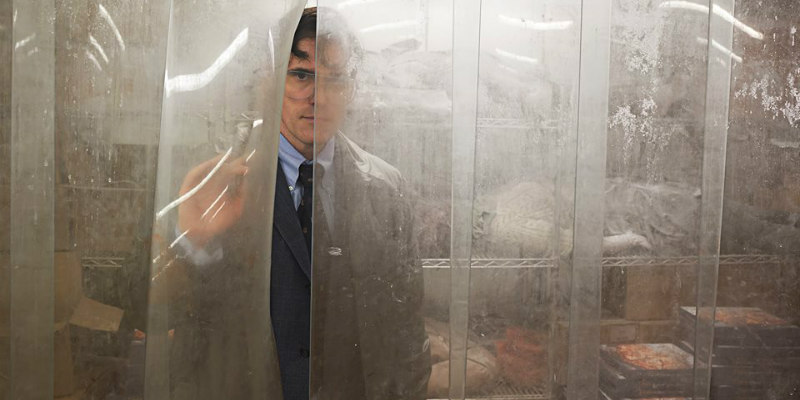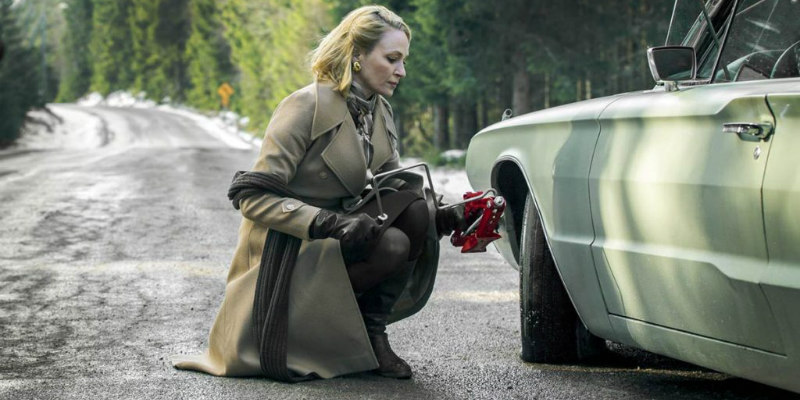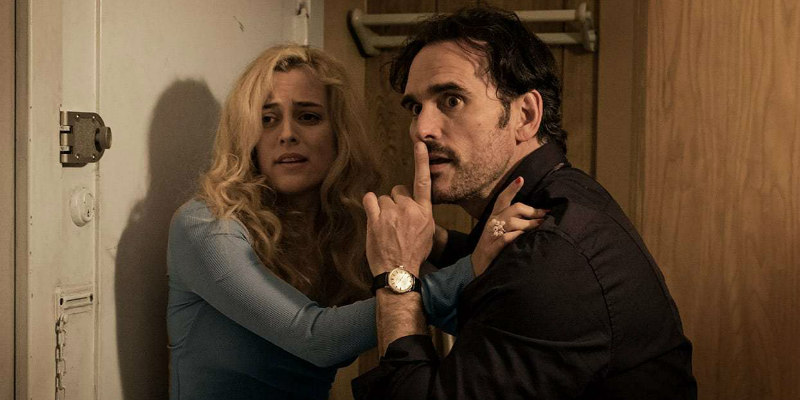A serial killer discusses his 'art' with a guide as he descends into the
depths of hell.
Directed by: Lars von Trier
Starring: Matt Dillon, Bruno Ganz, Uma Thurman, Riley
Keough, Siobhan Fallon Hogan, Jeremy Davies, Sofie Gråbøl
The closing credits of Lars von Trier's attention seeking 2009
shocker Antichrist credited a 'Horror Movie Researcher'
among its contributors. I guess Von Trier considers horror movies below him,
even though he's more beloved by gorehounds than he would no doubt like to
admit, and his 1994 TV series The Kingdom ranks with the best
examples of small screen horror filmmaking. I'm also guessing that he hasn't
seen movies like Man Bites Dog and
American Psycho, or outside the horror genre, Woody Allen's
Crimes and Misdemeanors and Chaplin's
Monsieur Verdoux, as Von Trier's latest, The House That Jack Built, gives the impression that the Great Dane believes himself the first
filmmaker to employ a crime drama narrative as a means of commenting on
white male privilege.
Von Trier makes the point early on that his protagonist, arrogant serial
killer Jack (Matt Dillon), is able to get away with his crimes
because his skin colour allows him to evade suspicion. Over 155 minutes, he
labours this point over and over as though he's had some Eureka like
revelation that has eluded all those before him. As Jack descends through
the depths of a Tarkovsky For Dummies vision of Hell, he boasts of his
crimes to an infernal guide, Verge (Bruno Ganz), comparing his
handywork to that of an artist, quoting works of art and historical moments
in the manner of a pub bore who just discovered Wikipedia.
Jack relates five specific incidents from his serial killing career, and
these gore-laden stories give the film the feel of a particularly gruesome
horror anthology in which breasts are torn off, ducks are mutilated and
taxidermy is performed on the corpses of small children. Each of Jack's
victims is defined by a red coloured prop - a car jack; a shopping trolley;
a set of MAGA style baseball caps; a telephone; and a hooded robe - and Jack
himself gets around in a blood red van. Like everything in this film, the
metaphor is decidedly on the nose, with Jack - who at one point rants about
how women are always portrayed as the victim while cutting off a woman's
breasts - thinking of himself not as the Big Bad Wolf, but as Little Red
Riding Hood.
Von Trier goes so out of his way to make Jack unlikeable that the movie
suffers heavily in its second half, by which point we're fully off the fence
regarding any empathy we might have previously had for the obnoxious,
self-absorbed killer. An extended scene involving a young blonde victim (Riley Keough) is rendered redundant by Von Trier playing it in the manner of a suspense
sequence, psychologically putting us in the victim's shoes, yet we already
know she's doomed.
Far more successful are the film's earlier sequences, in which Von Trier
cons us into rooting for Jack in that cinematic Stockholm Syndrome manner
which all great filmmakers are capable of. A scene involving an inquisitive
cop (Ed Speleers) who arrives at a house which has just been cleaned
by the OCD suffering Jack, following his murder of the homeowner, is
unbearably tense. Von Trier mines some effective black comedy from Jack's
OCD and initial self-doubt, with the killer forced to return over and over
again to a crime scene, tortured by the notion that he may have left some
minute trace of his crime intact. It's as great an example of the comedy of
repetition as you'll find in the work of more outright comedic
filmmakers.
As Jack grows more confident in his ability to literally get away with
murder, his OCD disappears and he begins purposely taking risks, dragging
corpses around in plain sight, taunting cops who are too distracted by
harassing black loiterers to pay heed to him, and screaming his murderous
confessions from the balcony of an apartment block. It's clear Von Trier has
nothing but contempt for his dual protagonist/antagonist, and this hatred
hurts his film. I think filmmakers should have some degree of sympathy for
their villains, otherwise they simply become one-dimensional vessels for
their creator's personal bugbears, which is most definitely the case with
Von Trier's Jack, who couldn't be more of a Trump surrogate if he wore an
ill-fitting red tie.
Yet even though The House That Jack Built is essentially a
2.5 hour lecture on a subject that's been handled far more efficiently by
subtler filmmakers in the past, it's rarely dull. From the opening frames
we're reminded that we're in the hands of one of the most ingenious
filmmakers of his generation, and even on an off day Von Trier is capable of
staggeringly delicious filmmaking. There are moments in
The House That Jack Built that could only have come from the
mind of Von Trier, and even if they're immaturely designed to shock, you
have to applaud their macabre ingenuity. If you have the stomach for it,
you'll find striking images here the like of which you've never seen before.
If only Von Trier could find a better vessel to contain them.
The House That Jack Built is on MUBI
UK now.






